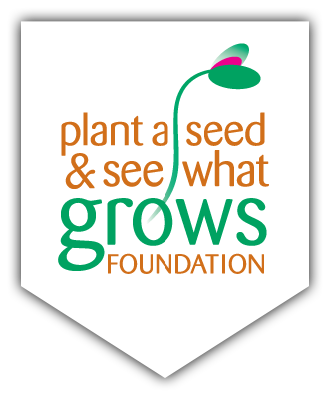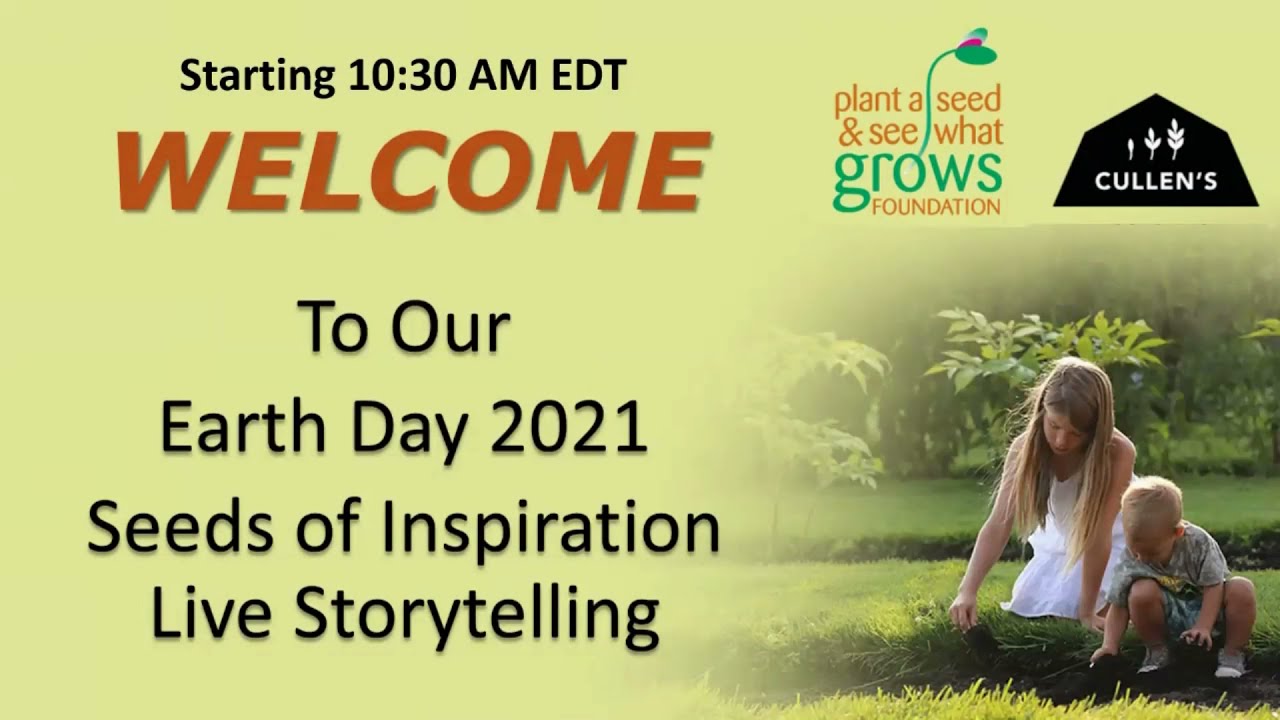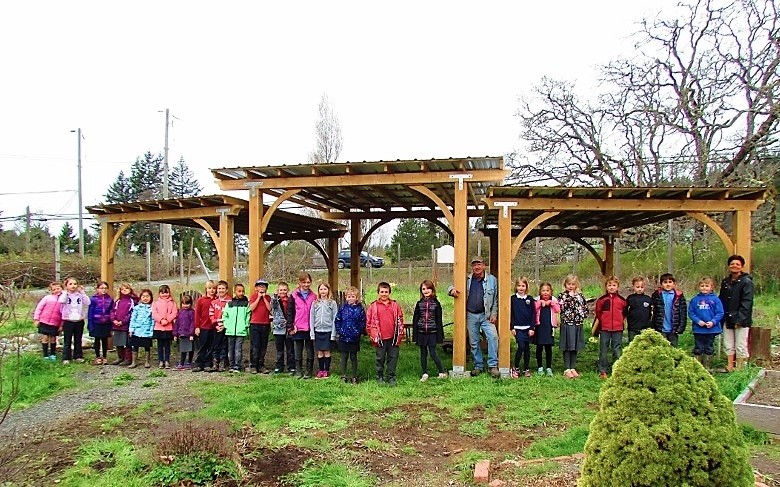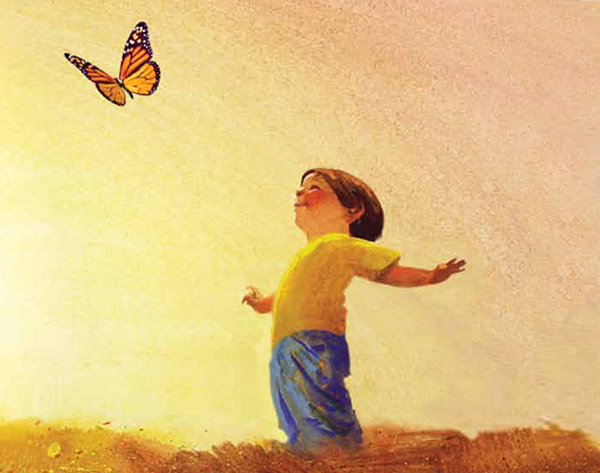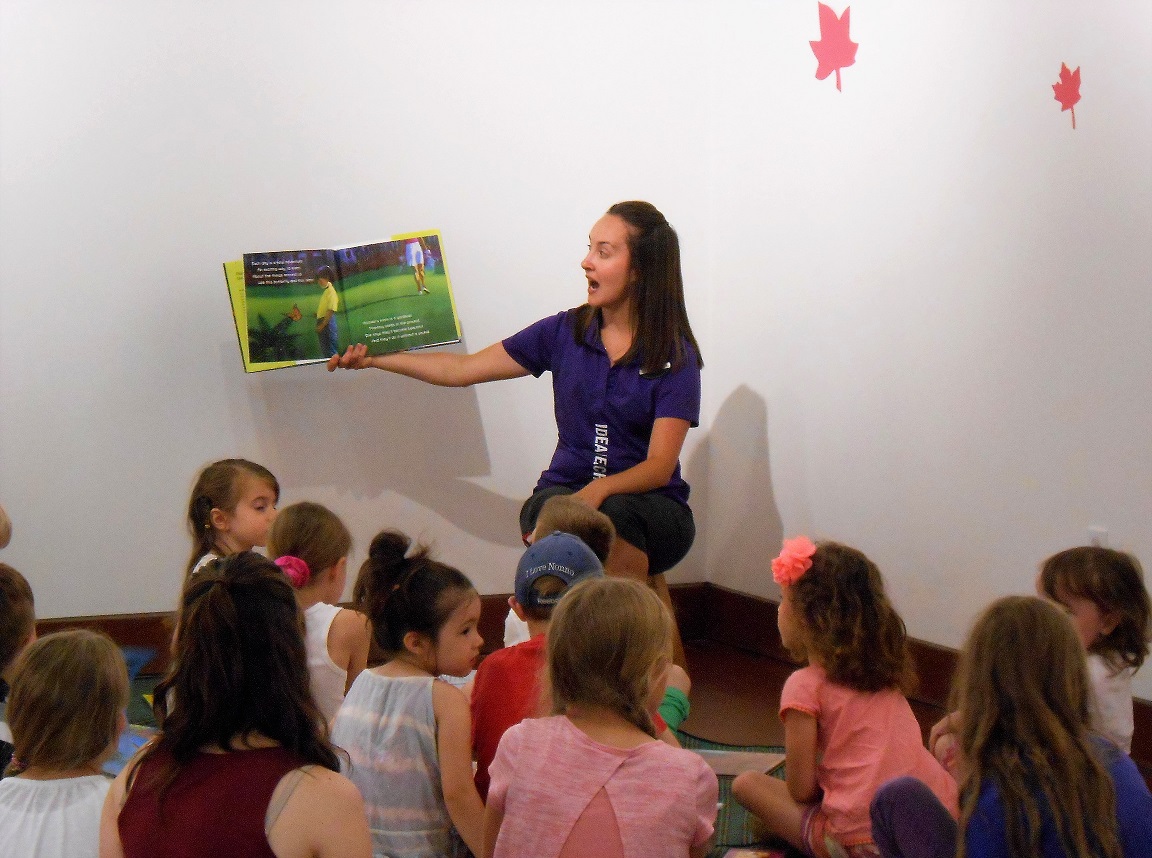One year ago the Plant a Seed & See What Grows Foundation helped launch yet another school garden program in Canada, at Deer Lake School in Burnaby, BC. As the current school year (such as it is) winds down, we thought it would be a good time to take a look at the results of this worthy project. Of course, this year’s spring season planting was limited, and subsequent harvesting not possible due to the COVID-19 outbreak, but this did little to stifle the positive impact that the garden project had on all who participated. Let’s take a look at the feedback we have received from this proud group of green thumbs!
How the Deer Lake School Garden Project Has Made a Positive Difference in the Lives of Students and Faculty
Fostered Collaboration, Problem Solving and Applied Design
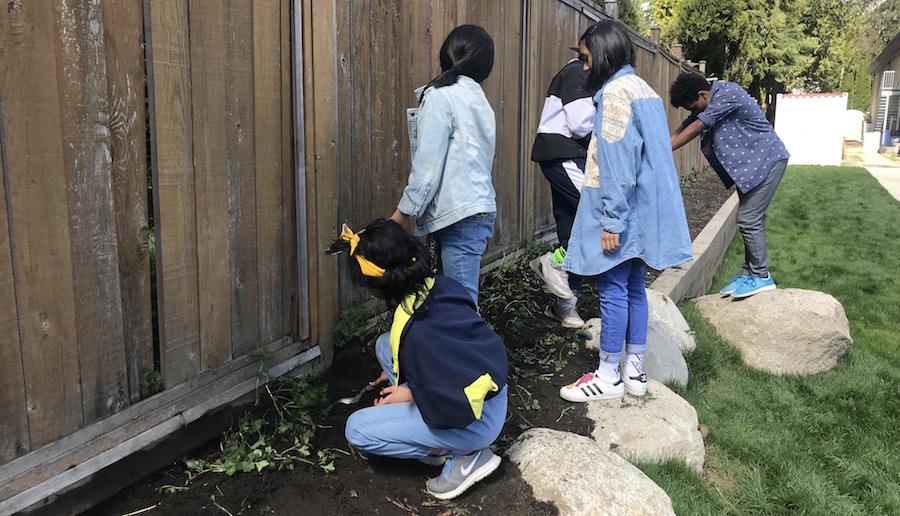
The connection between a school garden and horticultural education is clear, but other forms of knowledge and skill development are evident during project inception and the early stages to follow. For instance, as the project broke ground, students from Deer Lake’s Grade 8 Applied Design class and the Grade 9 class collaborated to help analyze formal design drawings, assemble the materials, and prepare the garden site. These adolescents tapped into their cognitive and creative abilities for problem solving and applied design.
Gave K-5 Students Tangible Insight into the Seed to Table Concept
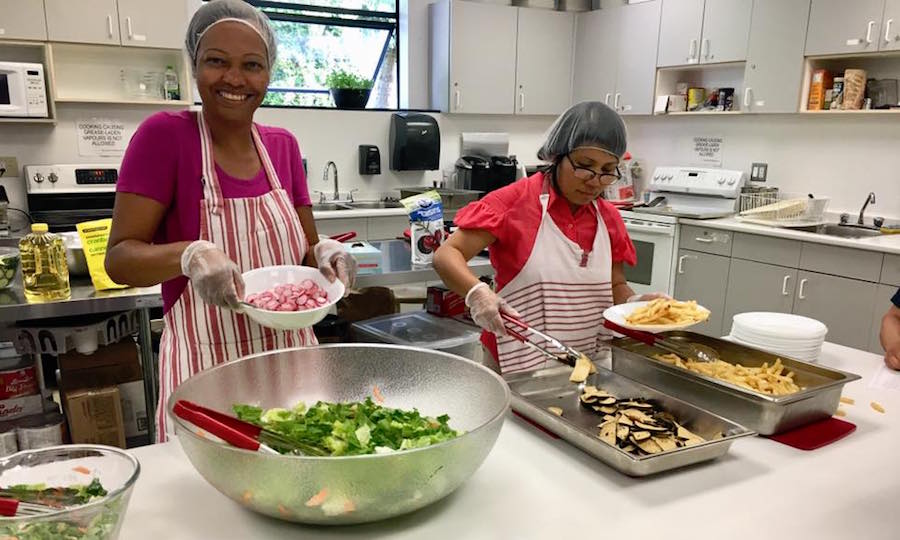
One segment considered among the primary stakeholders (so to speak) for this project are K-5 students and WOW did they shine bright!
They took on the responsibility of planting in the garden beds, putting to soil a large variety of nutritious crops-to-be, including radishes, peas, carrots, lettuce, beans, tomatoes, onions, watermelon, herbs, nasturtium, rhubarb, beets, corn, kale, spinach and sunflowers. As the 2019 school year came to a conclusion, they were able to harvest some of the fruits (or should be say vegetables) of their labor. The harvest was used to contribute to the school’s lunch program, which allowed students to witness the seed-to-table concept in action. But the harvest kept on giving beyond the end of the 2018-19 school year:
“The small garden the K-5 students planted had a huge harvest. Throughout the summer our support staff and various teachers who dropped by were able to enjoy vast quantities of fresh tomatoes, peas, green beans, corn and lettuce. In the fall of 2019 when school resumed , there were still many cherry tomatoes, kale, lettuce, sunflowers and watermelon ready to harvest and explore. Cleaning the beds for winter enabled students to study all the parts of the plants. We were also able to harvest some spinach, kale and lettuce all during the winter months, even in the snow! Students could freely snack on them during recesses. In fact, there was so much harvest from the garden that our own staff couldn’t keep up with it all and it sparked the idea to do more this past summer to connect with the Food Bank, or with Quest Food Exchange, to receive some of our extra vegetables.” – Gaileen Woytko, Director of Operations, Deer Lake School
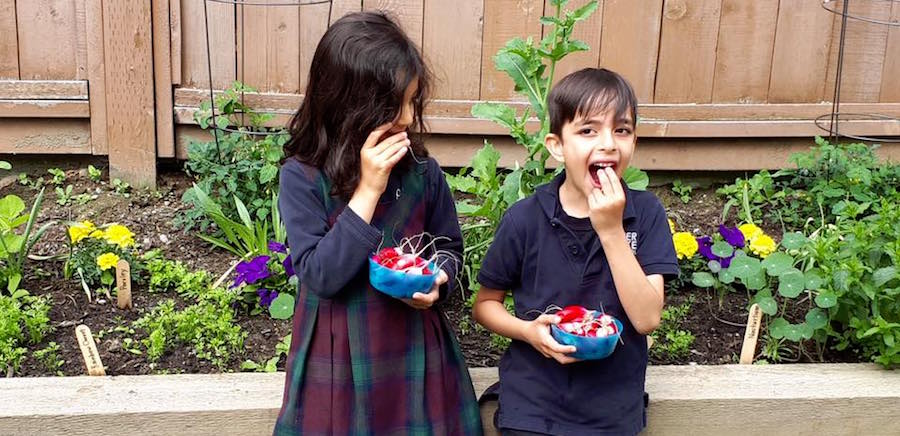
Provided a Sanctuary for Much Needed Pollinators
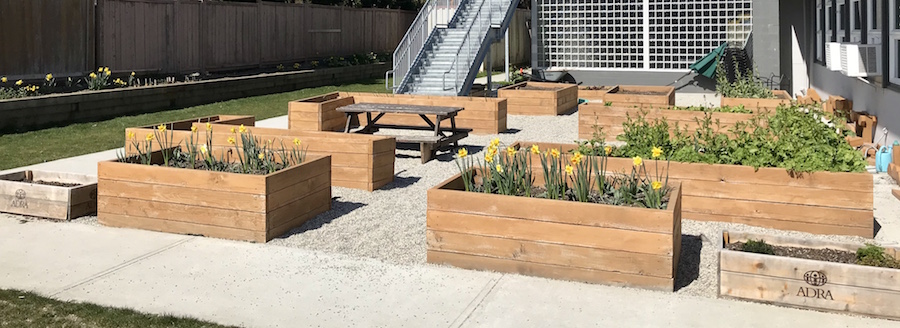
Pollinators are a critical part of our ecosystem. If they don’t thrive, we don’t thrive, and now participating students (our future) understand this very well. Deer Lake School’s Grade 7 class took on a very important role, planting and caring for a pollinator garden that produced a healthy variety of wildflowers that will continue to attract an array of essential pollinators for years to come. The entire Burnaby, BC community is in good hands thanks to these young gardeners!
An Opportunity for Mentorship
There were mentoring opportunities throughout the school garden project. Sure, older students provided guidance to their younger peers, but to the delight of teachers they found the opposite to be true too. The results were not only inspiring, but downright adorable!
“Teachers found some unique learning opportunities within our school where younger students taught older students about the garden. An example for us was with kindergarten students who planted daffodil bulbs and learned what care they needed, their life cycle, and so they had an opportunity to teach the Grade 3 class how to water and care for the bulbs. It was an unexpected benefit of having various grades involved in the garden.” – Gaileen Woytko
Provided Opportunity to Get a Healthy Daily Dose of Fresh Air
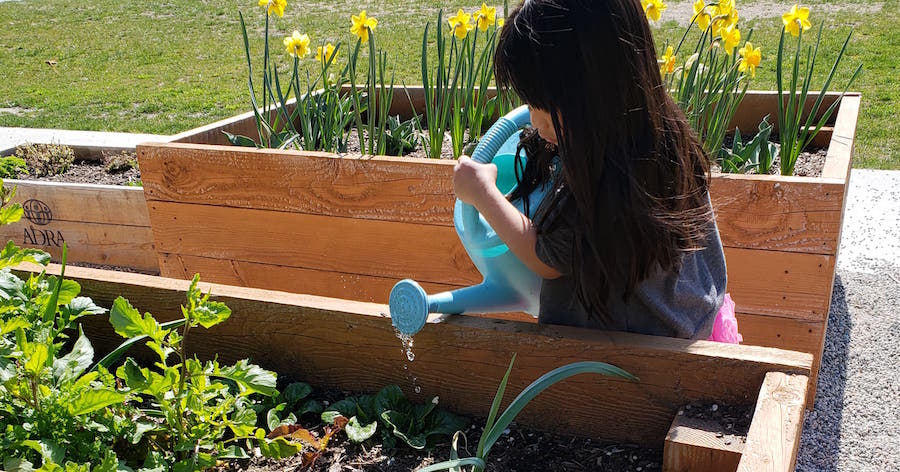
Beyond recess and lunch hour there is little opportunity to get outside in a traditional school setting. However, with a large number of studies validating a strong shift towards outdoor learning experiences, schools across Canada are looking for ways to incorporate the great outdoors into their respective curricula. A school garden is a perfect channel for this, and Deer Lake most certainly took advantage of it:
“It got kids outside in the fresh air and kept them physically active for several weeks.“ – Gaileen Woytko
The Unexpected Benefits
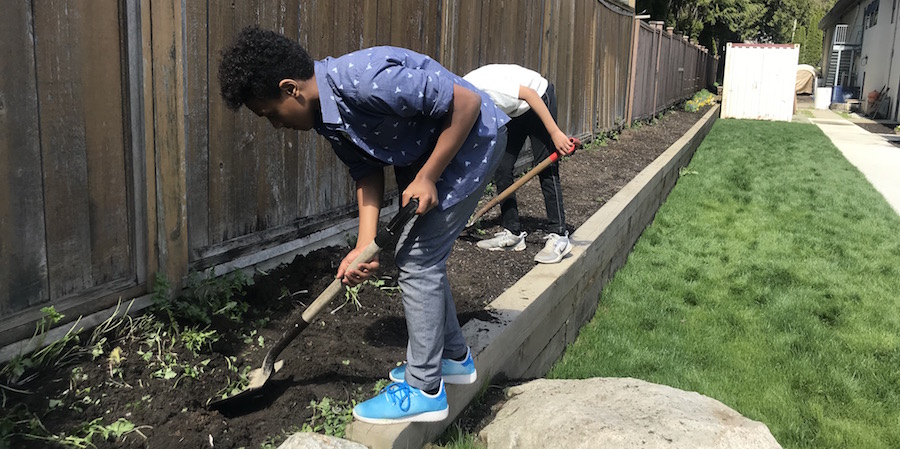
K-5 students learned all about the seed-to-table process. Grade 8 and 9 students explored more intensive concepts of growing, harvesting, processing, packaging, transporting, marketing, consumption, and disposal of food and food-related items. Grade 11 students dug deep into life sciences, studying plants and the variables that affect plant life from their very own school garden. All of these tremendous learning experiences were anticipated in some shape or form. However, there were some unanticipated benefits that were realized throughout.
i) Supported First People’s Principals of Learning
When Deer Lake School planned to build a garden, they did not anticipate that it would have to support their First People’s Principles of Learning. The garden turned out to be a tremendous asset in that regard, through the following:
- Supported the well-being of the self, the family, the community, the land, the spirits, and the ancestors.
- Provided a holistic, reflexive, reflective, experiential, and relational experience that focused on connectedness, on reciprocal relationships, and a sense of place.
- Gave insight into the consequences of one’s actions.
- Helped foster a sense of patience and understanding that anything worth doing may take time.
ii) Taught Students About Food Waste
Food waste is a large problem in Canada. Not only is it evident in households, but in Canadian schools too. After a successful harvest, Deer Lake Secondary quickly discovered an issue that would soon provide another amazing opportunity for learning:
“Since our students have started growing vegetables in the garden they have commented about the amount of food waste they are noticing in our hot lunch. It has brought a new awareness on how the production of food really works, how labor intensive it is, and how much food waste there is in our community.“ – Gaileen Woytko
iii) Formed a New Respect for Insects (and other crawlies)
Insects are a misunderstood lot and are often dismissed as creepy crawlies to be squashed underfoot. Deer Lake School students no longer think this way thanks to the garden project. They now understand the concept of beneficial bugs and other critical writers:
“Younger students have learned a new respect for insects as they work in the garden. Prior to having a garden, students had a lot of fear around bees, spiders, slugs, ants, moths, etc. But as they spent more time in the garden teachers observed that their fears disappeared and they had a new respect for the roles of insects in the gardening process.” – Gaileen Woytko
iv) Taking Their Work Home with Them
The 2020 school year quickly changed with the arrival of COVID-19 on Canadian soil. But while spring planting and harvesting on school grounds came to a halt, the learning process did not:
“Since we are presently not growing at the school due to COVID 19, our Kindergarten students (with the help of their parents) are setting up spaces in their yards and balconies to have pollinator gardens. Our kindergarten teacher is sending interested families seeds. So even if our school garden is on hold so far this year, we are still sharing the love and opportunities out into our community. It has been an unexpected new learning opportunity. Our students have been extremely proud of their garden! Teachers comment on that regularly, and during the COVID-19 period with distance learning, a Grade 4 teacher commented that one of the number one topics about what they miss at school has been the garden, and they ask regularly how it is doing.” – Gaileen Woytko
SOME CONCLUDING (AND INSPIRATIONAL) QUOTES FROM DEER LAKE FACULTY
“The garden has grown our students in wonderful ways. Small children, who will not eat a vegetable at home, eat them daily out of the garden. The wildlife that has started to enter our schoolyard makes our play space so much more interesting. From the addition of plants, we began to discover worms, new insects and how many different kinds of bees there are. Not long after these arrived, birds and small animals began appearing. We began to realize how much each of these elements depends on each other. Children learned to approach dirt and the natural world with respect and care. The patience and perseverance required for growing plants is a life lesson not often experienced in our fast, instant gratification culture. There is something in nature that calms the spirit of a child and at the same time excites their wonder and curiosity. It is something our urban students would rarely get to experience if they did not have this chance at school.” Heather Gagnier, Kindergarten Teacher
“With the garden I am excited for us to have the opportunity to have the space to investigate different types of plant life, without compromising the space in the classroom. The study of plant life can continue throughout the year as we are able to go out to the garden during multiple points to observe and interact with plants that have different growing seasons.” Kayla Whitworth, Life Science (Biology) / Chemistry & Anatomy & Physiology Teacher
“In a Bible class I teach, we have the opportunity to discuss ideas related to our spiritual selves and spiritual growth. To help illustrate this, my students and I planted seeds, cared for the plants and watched them grow. This gave us the opportunity to make some meaningful comparisons between what is needed for plant growth and what is needed for growth in our own lives!” (Kayla Whitworth)
“We are so grateful for the financial support we received from Plant a Seed! We believe it’s only just the beginning for our school as we learn how to more fully incorporate garden classroom learning into our entire K-12 school. Our engagement is growing, like our garden!” – Gaileen Woytko
HELP US GROW MORE SCHOOL GARDENS
Teachers, educational institutions and our partners are critical to the Foundation’s work. However, another party is essential to delivering outdoor learning programs to worthy young students – you! Without your help, we will not be able to expand our reach into your communities. Please sign up to be a Friend of the Foundation here, and if you’re able, please donate. The future generations of Canada thank you in advance for your generosity!
